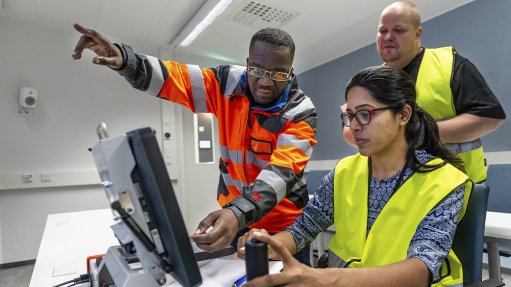
Sandvik uses technology to deliver training in a simulated working environment
With the rapid adoption of automation and digital technologies in mining, the need for constant upskilling has become essential, warns Sandvik Mining and Rock Solutions human resources development (HRD) manager Vusi Mnguni.
“Innovation in mining means that more changes are coming, but change is only possible with new competencies,” argues Mnguni. “Unless you have prepared your employees with the requisite skills to drive the change you want, that change process is doomed – as many people will resist what they do not know.”
The company offers a range of training initiatives in technical, managerial and other skills, conducted at its training academy using methods such as virtual, in-class, instructor-led, self-paced, nano learnings, simulated, on-the-job training, coaching, augmented and virtual reality. Specially developed programmes are mostly conducted in collaboration with tertiary institutions such as the University of Pretoria, Tshwane University of Technology (TUT), Colliery Training College, Sandvik Training Academy and other qualified skills development providers.
Mnguni notes that mechatronics competency is a focal point for Sandvik Mining and Rock Solutions, saying that decision-making is increasingly data driven, making it essential for employees to be able to interact with data and to understand and analyse the growing volume of data available.
Collaborating with the TUT, the company upskills millwrights and electricians through a mechatronics programme that deals with the marriage of mechanical, electrical and computer science.
“We have changed our apprenticeship programme to our Millwright Extended Programme which makes Artisan 4.0 a focal point. This includes basic skills in PLC programming and working with autonomous robots/vehicles,” he says. “This helps to equip the kind of artisan that industry really needs, as it is no longer enough to be specialised in the traditional trades. While regulated apprenticeship modules are generic, the apprentices need additional specialised training to be ready to work on modern mining equipment.”